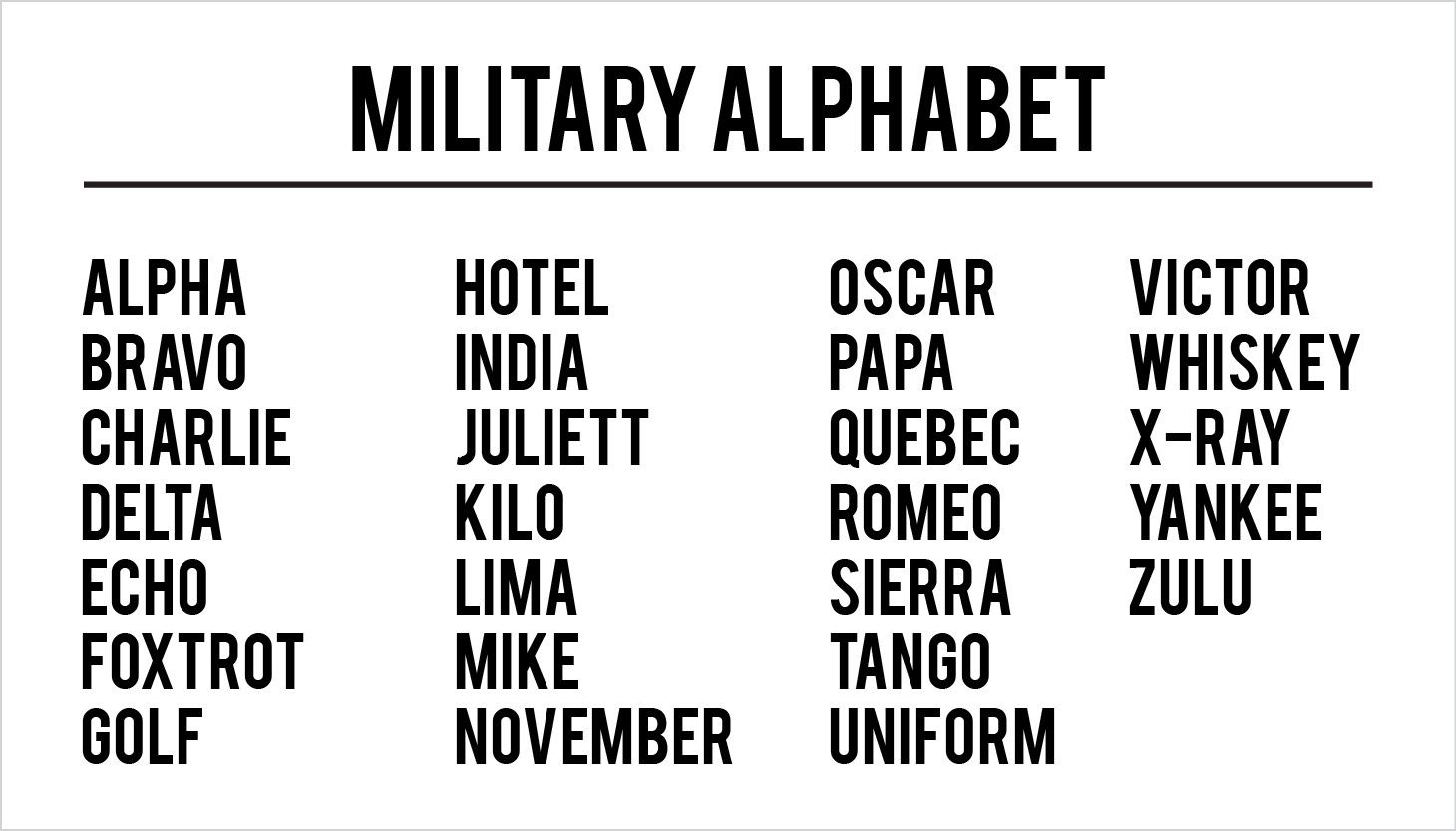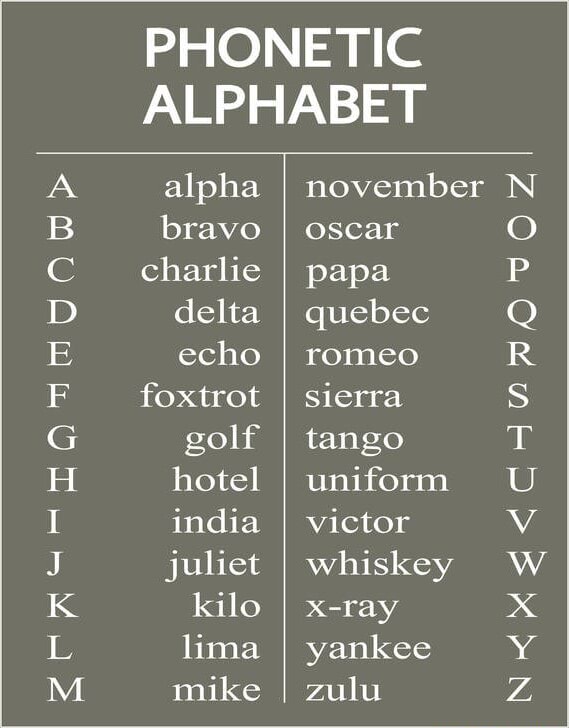Alpha beta charlie delta echo foxtrot golf hotel india juliet

Nato Phonetic Alphabet Alpha Bravo Charlie Delta Echo Foxtrot Golf Hotel India Juliet Kilo Lima Mike t-shirt. Categories Hobbies, Lifestyle, BlackStyle. Alpha Bravo Charlie Delta Echo Foxtrot Golf Hotel India Alpha beta charlie delta echo foxtrot golf hotel india juliet Kilo Lima Mike November Oscar Papa Quebec Romeo Sierra Tango Uniform Victor. Shop high-quality unique Alfa Bravo Charlie Delta Echo Foxtrot Golf Hotel India Juliett Kilo Lima Mike November Oscar Papa Quebec Romeo Sierra Tango Uniform. A, Number of letters in NATO phonetic alphabet: Alpha, Bravo, Charlie, Delta, Echo, Foxtrot, Golf, Hotel, India, Juliet, Kilo, Lima, Mike, November.
College Ruled Notebook - Alphabet Series Paperback
The Able Baker system continued to be used by ground and aircraft personnel for civil aviation purposes. However, since many of the sounds were unique to the English language, a new version of the alphabet was developed in Latin America called the Ana Brazil alphabet. The drafted version contained sounds the were common in Spanish, French, and English. After further modifications were made by various approving agencies, a revised phonetic alphabet began being used in Some words were hard to understand under poor radio communications and some words were hard to differentiate, such as Delta and Extra.
Many reverted back to the original Able Baker alphabet due to these issues. Further studies were conducted that lead to the changing of five words within the alphabet: C, M, N, X, and U. The ICAO created a recording of the new alphabet and sent it to all member states in In , the ITU mandated the improved version be used by all military, civilian, and amateur radio operators.
This version is the most familiar version of the military alphabet since it is still in use today. The other reason is because some of the previously used code words sounded similar to other code words that were being used. Eventually, code words were found and selected that resolved both of these issues.
In , in order to have a comprehensive way for communications between all military branches, the American alphabet eventually became known as Able Baker. These were the first two words for the first two letters of the alphabet, A and B, and it was utilized by all branches of the military.
The Able Baker system continued to be used by ground and aircraft personnel for civil aviation purposes. However, since many of the sounds were unique to the English language, a new version of the alphabet was developed in Latin America called the Ana Brazil alphabet.
The drafted version contained sounds the were common in Spanish, French, and English. After further modifications were made by various approving agencies, a revised phonetic alphabet began being used in Some words were hard to understand under poor radio communications and some words were hard to differentiate, such as Delta and Extra. Many reverted back to the original Able Baker alphabet due to these issues.
Further studies were conducted that lead to the changing of five words within the alphabet: C, M, N, X, and U. The ICAO created a recording of the new alphabet and sent it to all member states in In , the ITU mandated the improved version be used by all military, civilian, and amateur radio operators.
This version is the most familiar version of the military alphabet since it is still in use today. After further study and modification by each approving body, the revised alphabet was adopted on 1 November , to become effective on 1 April for civil aviation but it may not have been adopted by any military.
Problems were soon found with this list. Some users believed that they were so severe that they reverted to the old "Able Baker" alphabet. Alpha beta charlie delta echo foxtrot golf hotel india juliet Confusion among words like Delta and Extra , and between Nectar and Victor , or the poor intelligibility of other words during poor receiving conditions were the main problems. Later in , ICAO decided to revisit the alphabet and their research.
To identify the deficiencies of the new alphabet, testing was conducted among speakers from 31 nations, principally by the governments of the United Kingdom and the United States. Among the more interesting of the research findings was that "higher noise levels do not create confusion, but do intensify those confusions already inherent between the words in question". By early the ICAO was nearly complete with this research, and published the new official phonetic alphabet in order to account for discrepancies that might arise in communications as a result of multiple alphabet naming systems coexisting in different places and organizations.
Air Force research. After all of the above study, only the five words representing the letters C, M, N, U, and X were replaced. It was finally adopted by the IMO in In the official version of the alphabet, [4] two spellings deviate from the English norm: Alfa and Juliett.
Alfa is spelled with an f as it is in most European languages because the spelling Alpha may not be pronounced properly by native speakers of some languages — who may not know that ph should be pronounced as f. The spelling Juliett is used rather than Juliet for the benefit of French speakers, because they may otherwise treat a single final t as silent.
For similar reasons, Charlie and Uniform have alternative pronunciations where the ch is pronounced "sh" and the u is pronounced "oo". Early on, the NATO alliance changed X-ray to Xray in its version of the alphabet to ensure that it would be pronounced as one word rather than as two, [35] while the global organization ICAO keeps the spelling X-ray.
For the and phonetics, each transmission of figures is preceded and followed by the words "as a number" spoken twice. The ITU adopted the IMO phonetic spelling alphabet in , [50] and in specified that it be "for application in the maritime mobile service only". Pronunciation was not defined prior to For the post phonetics, the underlined syllable of each letter word should be emphasized, and each syllable of the code words for the post figures should be equally emphasized.
The Radiotelephony Spelling Alphabet is used by the International Civil Aviation Organization for international aircraft communications.  Since 'Nectar' was changed to 'November' in , the code has been mostly stable. However, there is occasional regional substitution of a few code words, such as replacing them with earlier variants, because of local taboos or confusing them with local terminology.
Since 'Nectar' was changed to 'November' in , the code has been mostly stable. However, there is occasional regional substitution of a few code words, such as replacing them with earlier variants, because of local taboos or confusing them with local terminology.
Contents move to sidebar hide. Article Talk. Read Edit View history. Tools Tools. Download as PDF Printable version. This is the latest accepted revision , reviewed on 4 May Letter names for unambiguous communication. Not to be confused with International Phonetic Alphabet. ICAO spelling alphabet.
Problems playing this file. See media help. This section needs additional citations for verification. Please help improve this article by adding citations to reliable sources in this section. Unsourced material may be challenged and removed. Archived from the original on 27 December Retrieved 1 January North Atlantic Treaty Organization.
Archived PDF from the original on 25 September Retrieved 16 February International Civil Aviation Organization. Archived from the original on 20 June Retrieved 2 July Archived PDF from the original on 12 April National Communications System.
Archived from the original on 29 October Retrieved 11 November Archived from the original on 11 November Archived PDF from the original on 3 October Archived from the original on 6 March Retrieved 22 August Archived from the original on 12 February Retrieved 23 January July Archived from the original on 11 July Retrieved 18 June DIN Retrieved 27 December Archived from the original on 26 June Archived PDF from the original on 9 December Retrieved 10 November Archived from the original on 20 January
Popular Pages
- 2024 us masters
- British open winning scores
- Golf betting statistics
- Tpc sawgrass polo
- Horse race style golf bet
- Honda classic golf betting tips 2019
- Highest paid euroleague player
- Sky bet open golf each way
- Golf betting system wells fargo
- Us open bookmakers
- American masters golf betting odds
- Ryder cup bbc
- Players golf betting
- Best masters golf bets
- Pga leaderboard today cut line